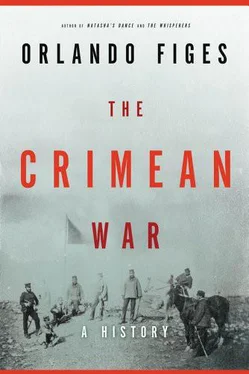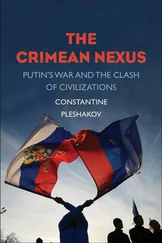There was a powerful Greek lobby in the ruling circles of St Petersburg. The Foreign Ministry contained a number of Greek-born diplomats and activists of the Greek cause. None was more important than Alexandru Sturdza from Moldavia, a Phanariot on his mother’s side, who became the first Russian governor of Bessarabia, or Ioannis Kapodistrias, a Corfu nobleman who was appointed Russia’s Foreign Minister jointly with Karl Nesselrode in 1815. The Greek Gymnasium in St Petersburg had been training Greek-born youths for military and diplomatic service since the 1770s, and many of its graduates had fought in the Russian army against the Turks in the war of 1806–12 (as did thousands of Greek volunteers from the Ottoman Empire, who fled to Russia at the war’s end). By the time Ypsilantis planned his uprising in Moldavia, there was a large cohort of Russian-trained, experienced Greek fighters on which he could count.
The plan was to start the uprising in Moldavia and then move to Wallachia. The insurgents would combine their attacks with the pandur (guerrilla) militia led by the Wallachian revolutionary Tudor Vladimirescu, another veteran of the Tsar’s army in the Russo-Turkish war of 1806–12, whose peasant followers were in practice more opposed to their Phanariot rulers and landlords than they were to the distant Ottomans. The Treaty of Bucharest had placed the principalities under the joint sovereignty of Russia and the Ottoman Empire. They did not have any Turkish garrisons but the local hospodars were allowed to maintain small armies, which Ypsilantis expected to join the uprising as soon as his army of Greek volunteers from Russia crossed the River Pruth. Ypsilantis hoped that the revolt would spark a Russian intervention to defend the Greeks once the Turks took repressive measures against them. In the Moldavian capital of Iaşi he appeared in a Russian uniform and announced to the local boyars that he had ‘the support of a great power’. There was certainly a great deal of support in the élite circles of St Petersburg, where philhellenic sentiment ran high, as well as among military and Church leaders. The Russian consulates in the principalities even became recruiting centres for the revolt. But neither Kapodistrias nor the Tsar knew anything about the preparations for the uprising, and both men denounced it as soon as it began. However much they might have sympathized with the Greek cause, Russia was the founder of the Holy Alliance, the conservative union formed with the Austrians and Prussians in 1815, whose raison d’être was to combat revolutionary and nationalist movements on the European continent.
Without Russian support, the Greek uprising in the principalities was soon crushed by 30,000 Turkish troops. The Wallachian peasant army retreated to the mountains, and Ypsilantis fled to Transylvania, where he was arrested by the Austrian authorities. The Turks occupied Moldavia and Wallachia, and carried out reprisals against the Christian population there. Turkish soldiers looted churches, murdered priests, men, women and children and mutilated their bodies, cutting off their noses, ears and heads, while their officers looked on. Thousands of terrified civilians fled into neighbouring Bessarabia, presenting the Russian authorities with a massive refugee problem. The violence even spread to Constantinople, where the patriarch and several bishops were publicly hanged by a group of janizaries on Easter Sunday 1821.
As news spread of the atrocities, causing ever-stronger Russian sympathy for the Greek cause, the Tsar felt increasingly obliged to intervene, despite his commitment to the principles of the Holy Alliance. As Alexander saw it, the actions of the Turks had gone well beyond the legitimate defence of Ottoman sovereignty; they were in a religious war against the Greeks, whose religious rights the Russians had a duty to protect, according to their interpretation of the Treaty of Kuchuk Kainarji. The Tsar issued an ultimatum calling on the Turks to evacuate the principalities, restore the damaged churches, and acknowledge Russia’s treaty rights to protect the Sultan’s Orthodox subjects. This was the first time any of the powers had spoken out on behalf of the Greeks. The Turks responded by seizing Russian ships, confiscating their grain, and imprisoning their sailors in Constantinople.
Russia broke off diplomatic relations. Many of the Tsar’s advisers favoured war. The Greek revolt had spread to central Greece, the Peloponnese, Macedonia and Crete. Unless the Russians intervened, they feared that in these regions it would be repressed with similar atrocities to those in the principalities. In 1822 Ottoman troops brutally crushed a Greek uprising on the island of Chios, hanging 20,000 islanders and deporting into slavery almost all the surviving population of 70,000 Greeks. Europe was outraged by the massacre, whose horrors were depicted by the French painter Eugène Delacroix in his great masterpiece The Massacre of Chios (1824). In the Russian Foreign Ministry, Kapodistrias and Sturdza argued for military intervention on religious grounds. In a rehearsal of the arguments employed in 1853 for Russia’s invasion of the principalities, they reasoned that the defence of Christians against Muslim violence should outweigh any considerations about the sovereignty of the Ottoman Empire. To support revolts in, say, Spain or Austria, they maintained, would be a betrayal of the principles of the Holy Alliance, because these two nations were both ruled by lawful Christian sovereigns; but no Muslim power could be recognized as lawful or legitimate, so the same principles did not apply to the Greek uprising against the Ottomans. The rhetoric of Holy Russia’s duty to its co-religionists was also employed by Pozzo di Borgo, the Tsar’s ambassador to France, though he was more interested in promoting Russia’s strategic ambitions, calling for a war to expel the Turks from Europe and establish a new Byzantine Empire under Russian protection.
Such ideas were widely shared by high officials, army officers and intellectuals, who were increasingly united in the early 1820s by their Russian nationalism and at times by an almost messianic commitment to the Orthodox cause. There was talk of ‘crossing the Danube and delivering the Greeks from the cruelties of Muslim rule’. One leader in the southern army called for a war against the Turks to unite the Balkan Christians in a ‘Greek Kingdom’. The pro-war lobby also had supporters at the court, where the legitimist principles of the Holy Alliance were more strictly recognized. The most enthusiastic was Baroness von Krüdener, a religious mystic who encouraged Tsar Alexander to believe in his messianic role and campaigned for an Orthodox crusade to drive the Muslims out of Europe and raise the cross in Constantinople and Jerusalem. She was dismissed from the court and ordered by the Tsar to leave St Petersburg. 13
Alexander was far too committed to the Concert of Europe to give serious consideration to the idea of unilateral Russian intervention to liberate the Greeks. He stood firmly by the Congress System established at Vienna by which the great powers had agreed to resolve major crises through international negotiation, and realized that any action in the Greek crisis was bound to be opposed. By October 1821 a European policy of international mediation over Greece had already been coordinated by Prince Metternich, the Austrian Foreign Minister and chief conductor of the Concert of Europe, together with the British Foreign Secretary, Lord Castlereagh. So when the Tsar appealed to them for support against Turkey, in February 1822, it was agreed to convene an international congress to resolve the crisis.
Alexander called for the creation of a large autonomous Greek state under Russian protection, much like Moldavia and Wallachia. However, Britain feared that this would be a means for Russia to advance its own interests and intervene in Ottoman affairs on the pretext of protecting its co-religionists. Austria was equally afraid that a successful Greek revolt would set off uprisings in parts of central Europe under its control. Since Alexander prized the Austrian alliance above all, he held back assistance to the Greeks, while continuing to urge collective European action to help them. None of the powers would support the Greeks. But two things happened in 1825 to change their minds: first, the Sultan called in Mehmet Ali, his powerful vassal in Egypt, to put down the Greeks, which the Egyptians did with new atrocities, giving rise to an ever-growing wave of pro-Greek sympathy and ever-louder calls for intervention in liberal Europe; and then Alexander died.
Читать дальше












